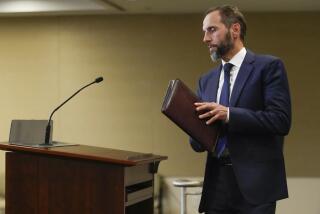Smith Opposed Irvine Co. Board Irrationally, Lawyer Tells Court
- Share via
BLOOMFIELD HILLS, Mich. — Joan Irvine Smith, who contends that the Irvine Co. is offering too little money for her stake in the company, was accused in court Monday of irrationally opposing almost every decision made by the company’s board of directors for more than two decades.
Company attorney William Campbell said Smith’s objection to the company’s 1983 offer to pay Smith and her mother $114 million for their 11% interest in the company had “nothing to do with dollars and cents.”
“Whatever does motivate her,” Campbell said, “is not something that exists in the rational business world.”
Campbell’s description of Smith as “vexatious” and his portrayal of her stormy history as a company board member triggered sharp protests from Smith’s attorney, Howard Friedman, who accused the company of “throwing sand.”
“This is not a case between the good guys and the bad guys. It is a case over the value of a company,” said Friedman, who is demanding $500 million, including interest and attorney fees, for his clients’ stock in the company.
Friedman is trying to prove that the company was worth about $3 billion in November, 1983, when Chairman Donald Bren sought to buy Smith’s stock, while the company contends that it was worth about $1 billion at the time.
But Campbell persisted in criticizing Smith. He pointed out that under Michigan law, a shareholder who files a dissenter’s lawsuit in bad faith can be required to pay all legal fees and forfeit any interest on the value of the stock. In Smith’s case, interest alone could amount to more than $50 million.
Campbell noted that so far, Smith is not scheduled to testify in the court hearings in Michigan, where the company is incorporated. “I think Mrs. Smith in the end should be called to task for bringing us all here,” he said.
In trying to build the company’s case, Campbell called to the witness stand Raymond L. Watson, vice chairman of the Irvine Co.
Watson, who was president in 1973-77, said that as a board member, Smith tried to block the 1971 incorporation of the City of Irvine and opposed funding the utilities and streets needed to allow development of the Irvine community of Woodbridge.
Smith’s Role Praised
Friedman, by contrast, applauded Smith’s part in persuading the company to donate land for the University of California, Irvine. “She had to force UCI down the board’s throat,” Friedman said.
He also asserted that Smith “brought this company into the 20th Century” by encouraging development of the company’s extensive land holdings.
The cross-questioning of Watson by Friedman evolved into a verbal sparring match that one company official in attendance characterized as “great drama.”
Friedman got Watson to agree that “a reasonable person” might have objected, as Smith did, to spending millions of dollars to prepare Woodbridge for development in 1974. At the time, Orange County was in a deep housing recession. The investment ultimately proved profitable because Woodbridge opened to home buyers after the market had rebounded.
But Watson said he believed that Smith’s dissenting votes on the board of directors were automatic, rather than based on a rational evaluation of potential risks and rewards.
Watson said that in 1977, he reviewed Smith’s voting record and found that since becoming a board member in 1957, she had voted against 80% of all management-backed proposals and abstained from voting on another 16%. He said she supported just 4% of management-sponsored proposals, and those involved dividend distributions to shareholders.
Plan to Increase Control
Watson said that in 1977, Smith suggested a plan to increase her family’s control of the company. Her proposal, which involved trading income-producing assets for Irvine Co. stock then held by the James Irvine Foundation, indicated that she considered the company to be worth about $200 million at that time, Watson said.
After Monday’s hearing, Friedman said that Watson’s description of Smith’s voting record was inaccurate and that he would disprove it later in court.
Smith, interviewed by telephone, said she could not recall supporting a plan to buy out the foundation by using company assets, although she said she remembered someone else proposing that idea. Nor could she, she said, remember asking Watson to stay on as president.
Smith, who had a longstanding feud with the James Irvine Foundation and pressed for legislation that ultimately required the foundation to divest its control of the company, said that as president of the Irvine Co., Watson had been “a foundation man.”
She further suggested that the Irvine Foundation might still be “behind” Watson’s testimony--a remark Watson said he found incredible.
“They’ll do anything they think they can to try to discredit me,” Smith said of Watson’s testimony, which will continue with more cross-questioning today.
“Considering the source,” she added, “it is not even worth commenting on.”
More to Read
Inside the business of entertainment
The Wide Shot brings you news, analysis and insights on everything from streaming wars to production — and what it all means for the future.
You may occasionally receive promotional content from the Los Angeles Times.










